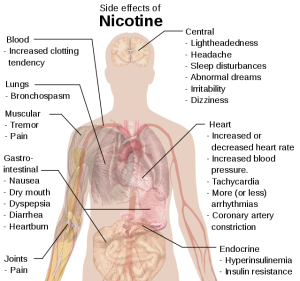President Obama celebrates smoke-free milestone
 White House Press Secretary Robert Gibbs told CNN’s Candy Crawley on “State of the Union” this weekend, that President Obama has not smoked a cigarette in about 9 months, although the President still chews Nicorette gum. “He’s done enormously well in quitting. It was a commitment that I think he made to himself at the end of the health care and with his two daughters in mind,” said Gibbs.
White House Press Secretary Robert Gibbs told CNN’s Candy Crawley on “State of the Union” this weekend, that President Obama has not smoked a cigarette in about 9 months, although the President still chews Nicorette gum. “He’s done enormously well in quitting. It was a commitment that I think he made to himself at the end of the health care and with his two daughters in mind,” said Gibbs.
Millions of Americans have health problems caused by smoking. Cigarette smoking and exposure to tobacco smoke cause an estimated average of 438,000 premature deaths each year in the United States. Of these premature deaths, about 40 percent are from cancer, 35 percent are from heart disease and stroke, and 25 percent are from lung disease. Smoking is the leading cause of premature, preventable death in this country.
Regardless of their age, smokers can substantially reduce their risk of disease, including cancer, by quitting.
Although most people know cigarette smoking is dangerous, most find it hard to quit. The reason is nicotine. Nicotine is a drug found naturally in tobacco. It is as addictive as heroin or cocaine. Over time, a person becomes physically and emotionally addicted to (dependent on) nicotine. Studies have shown that smokers must deal with both the physical and psychological (mental) dependence to quit and stay quit.
When tobacco is smoked, nicotine enters the lungs and is quickly taken into the blood system and distributed throughout the entire body. Nicotine and its breakdown products can remain in the body for up to 3-4 days after inhalation. Nicotine causes pleasant feelings in the smoker, which makes them want to smoke more. In addition, over time, the body builds up a tolerance to nicotine, meaning that a larger amount is required to get the same pleasant effect. This also leads to symptoms of withdrawal when the drug is no longer taken. These include:
- dizziness (which may only last 1 to 2 days after quitting)
- depression
- feelings of frustration, impatience, and anger
- anxiety
- irritability
- sleep disturbances, including having trouble falling asleep and staying asleep, and having bad dreams or even nightmares
- trouble concentrating
- restlessness or boredom
- headaches
- tiredness
- increased appetite
- weight gain
- constipation and gas
- cough, dry mouth, sore throat, and nasal drip
- chest tightness
Strong and consistent evidence shows that nicotine replacement products can help people quit smoking. These products are available in five forms—patch, gum, lozenge, nasal spray, and inhaler. They help smokers stop by providing nicotine in decreasing doses over time. This helps decrease withdrawal symptoms and does not contain the other harmful chemicals in tobacco smoke. There are also two prescription medications to aid in tobacco cessation:
Bupropion, a prescription antidepressant marketed as Zyban®, was approved by the FDA in 1997 to treat nicotine addiction. This drug can help to reduce nicotine withdrawal symptoms and the urge to smoke, and can be used safely with nicotine replacement products. Some common side effects of bupropion are dry mouth, difficulty sleeping, headache, dizziness, and skin rash. People should not use this drug if they have a seizure condition such as epilepsy or an eating disorder such as anorexia nervosa or bulimia, or if they are taking other medicines that contain bupropion hydrochloride. Also, people should avoid using alcohol while taking buproprion because alcohol consumption increases the risk of having a seizure.
Varenicline, a prescription medicine marketed as Chantix™, was approved by the FDA in 2006 to help cigarette smokers stop smoking. This drug may help those who wish to quit by easing their withdrawal symptoms and by blocking the effects of nicotine from cigarettes if they resume smoking. Some common side effects of varenicline are nausea, changes in dreaming, constipation, gas, and vomiting. People should not use this drug if they have kidney problems, and women should not use this drug if they are pregnant, plan to become pregnant, or are breastfeeding.
Although these drugs can be very useful to people trying to quit smoking, they are only part of the picture. Quitters also need emotional support from friends, family, and even online support groups. Smoking is often associated with other activities, such as eating, drinking, socializing and so on, and breaking these links also takes time and patience. Increasing exercise, and stress reduction techniques can also be helpful in the process.
For more information on smoking cessation, click here to go to the Resounding Health Casebook on the topic.
![]()


